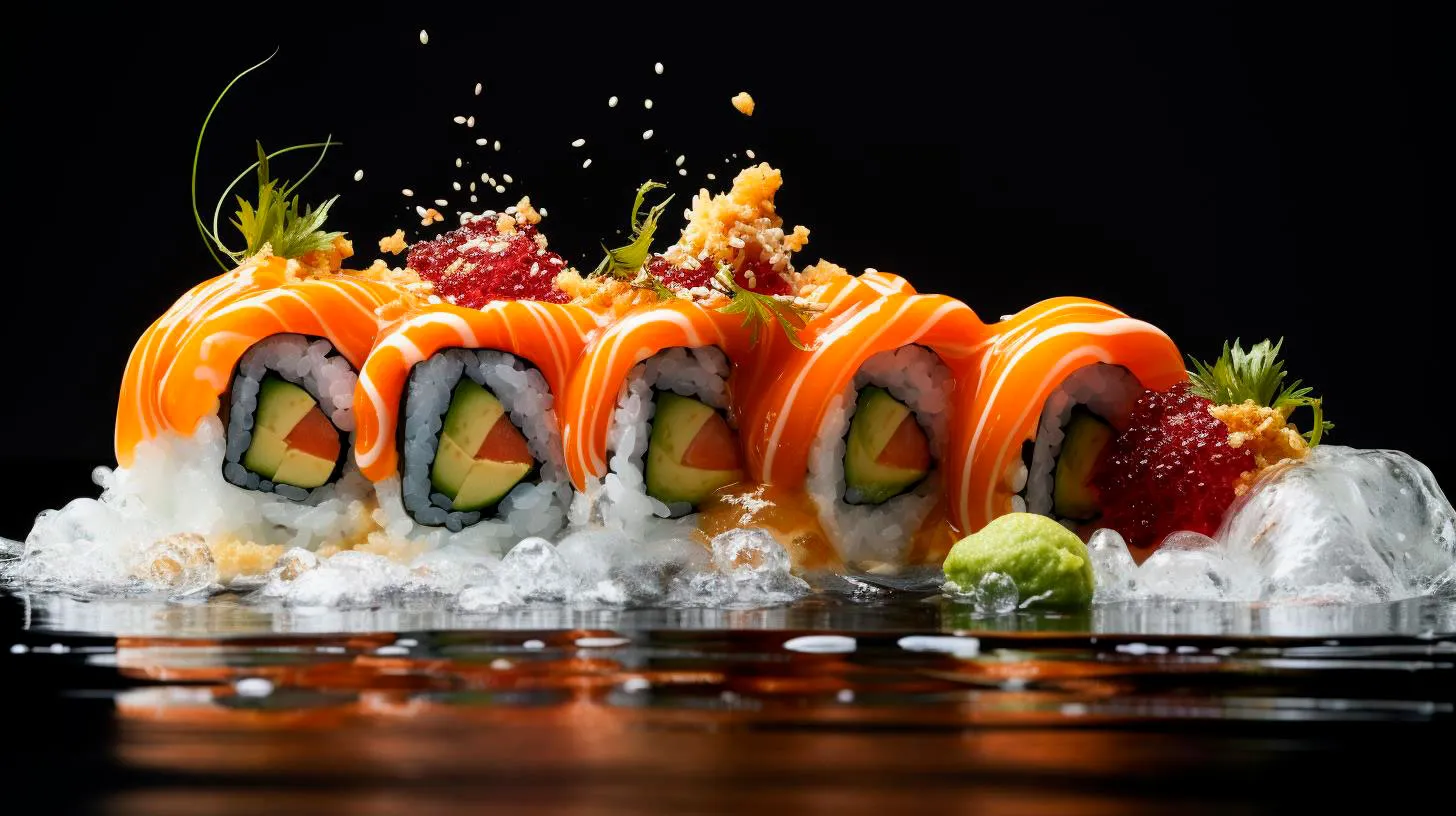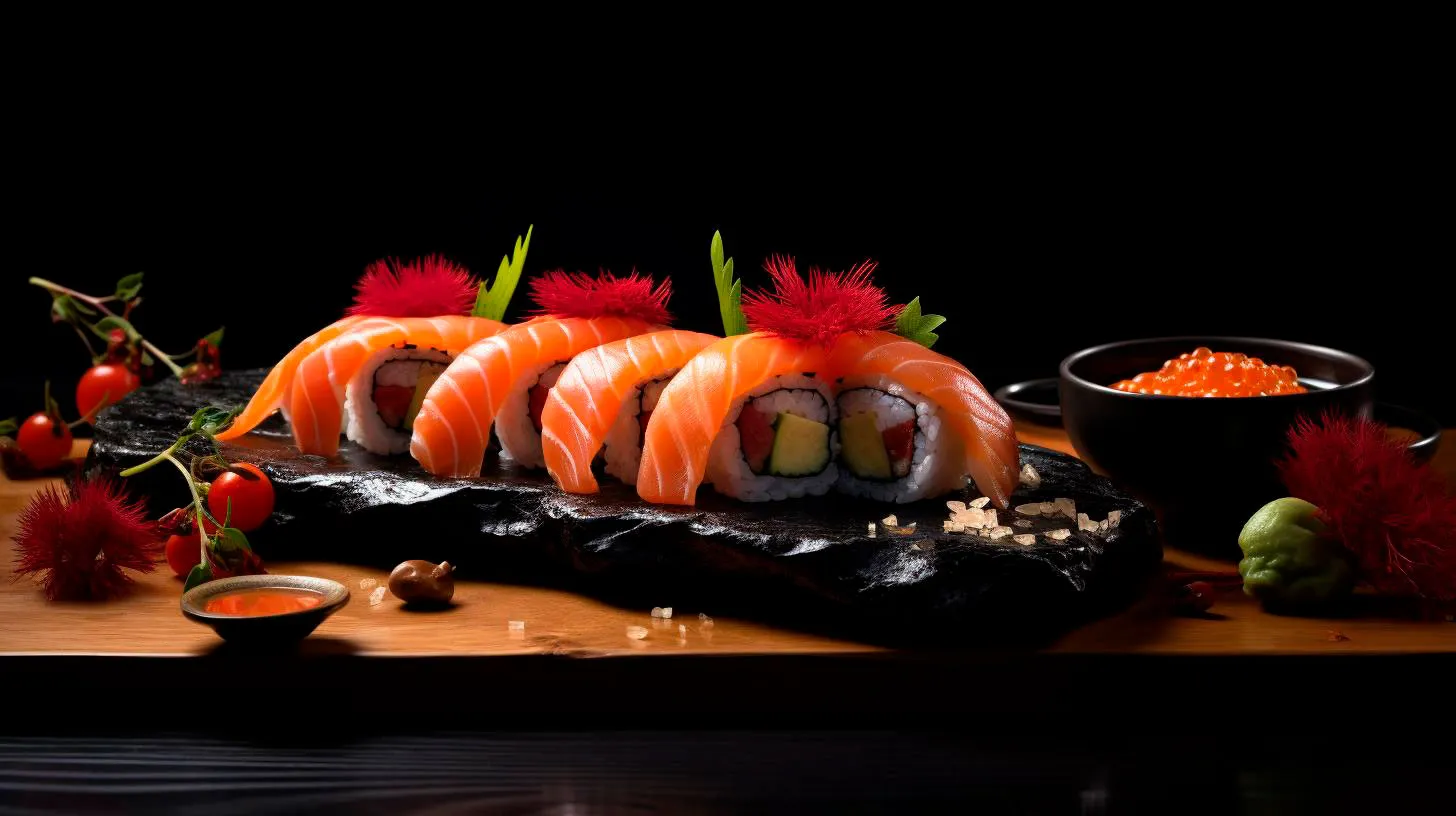Sushi: Exploring its Role in Strengthening International Relations
In this article, we will uncover the fascinating connection between sushi and diplomacy, exploring how this iconic dish has become a symbol of cultural exchange, economic cooperation, and global harmony.
A Symbol of Cultural Exchange
Sushi represents much more than just a meal on a plate. It serves as a powerful symbol of cross-cultural communication and understanding. As nations embrace sushi and incorporate it into their own culinary scenes, they actively engage in cultural exchange, fostering a deeper appreciation for Japanese traditions. Here are some important ways sushi contributes to cultural exchange:
- International restaurants: Sushi has gained popularity around the globe, giving rise to countless sushi restaurants worldwide. These establishments serve as community centers where people from diverse backgrounds come together to indulge in the art of sushi. It offers a unique opportunity for individuals to experience a slice of Japan’s cultural heritage, promoting understanding and appreciation.
- Cultural festivals: Many countries organize sushi-themed festivals that celebrate Japanese culture. These events often feature traditional music, dancing, and, of course, a variety of sushi dishes. By showcasing their sushi expertise, Japanese chefs, sushi masters, and culinary experts collaborate with international artists, performers, and organizations, fostering cultural connections.
- Culinary workshops and classes: Sushi-making workshops and classes have gained popularity across different countries. These educational experiences not only teach participants the art of sushi preparation but also provide insight into Japanese traditions, fostering a sense of cultural empathy and understanding.
Economic Cooperation Through Sushi
The global popularity of sushi has resulted in significant economic cooperation between countries. This humble dish has turned into a thriving industry, generating employment, trade, and business opportunities. Let’s explore some key ways sushi enhances economic collaboration:
- Export and import: The international demand for sushi has led to the establishment of an intricate supply chain that spans across continents. Japan exports high-quality seafood, seaweed, rice, and other sushi ingredients to countries worldwide, contributing to trade and economic growth. Additionally, importing sushi-grade fish creates opportunities for countries with strong seafood industries to thrive economically.
- Tourism: Sushi has become a magnet for food tourism, with enthusiasts traveling far and wide to sample authentic Japanese cuisine. This surge in global culinary tourism creates economic opportunities for nations as travelers seek out renowned sushi establishments, boosting local economies through increased hospitality, transportation, and tourism-related services.
- Retail and packaging: The global demand for sushi has led to an array of retail opportunities. Supermarkets, convenience stores, and food delivery services provide consumers with easily accessible sushi options. Simultaneously, the popularity of sushi has opened doors for innovative packaging companies to create sustainable and convenient sushi containers that cater to the on-the-go lifestyle of consumers.
Global Harmony Through Sushi
Sushi’s influence extends beyond cultural exchange and economic cooperation. This beloved dish has the power to bring people together, fostering connections and promoting global harmony. Let’s delve into some ways sushi contributes to global harmony:
- Cross-cultural dining: Sushi’s popularity transcends borders, making it a universal choice for individuals from diverse cultures. Sharing a sushi meal encourages dialogue, friendship, and the exchange of ideas, building bridges between people from different walks of life and promoting peace at the individual level.
- Diplomatic functions: Governments often use cuisine, including sushi, as a diplomatic tool during state visits and international events. Offering sushi to foreign dignitaries showcases a nation’s rich culinary heritage and hospitality, strengthening diplomatic ties and promoting positive relationships between countries.
- Celebrating diversity: Sushi’s global popularity serves as a testament to the beauty of diversity. It demonstrates how different cultures can come together and contribute to the enrichment of one another. By celebrating sushi as part of our collective culinary heritage, we embrace the ideals of inclusivity and acceptance.
Key Takeaways
Sushi’s journey from a traditional Japanese dish to an international ambassador is truly remarkable. Its ability to transcend cultural boundaries, foster economic cooperation, and promote global harmony make it more than just a culinary delight. Here are the key takeaways from the role of sushi in strengthening international relations:
- Sushi serves as a symbol of cultural exchange, creating opportunities for individuals to appreciate and understand different traditions.
- The popularity of sushi has led to significant economic cooperation, including export and import opportunities, culinary tourism, and innovative packaging solutions.
- Sushi brings people together, nurturing connections, and promoting global harmony through cross-cultural dining and diplomatic functions.
So, the next time you savor a piece of sushi, remember the profound impact it has on the world stage. Beyond its enticing taste, sushi is a testament to the power of food in fostering unity and strengthening relationships between nations.
How Sushi Can Forge Connections Between Cultures
Sushi’s popularity worldwide not only reflects its delicious taste but also the cultural exchange it represents. In this blog post, we will explore how sushi can forge connections between cultures, bringing people closer together through a shared love for this iconic dish.
The Rise of Sushi’s Global Popularity
Sushi’s journey from being a regional specialty to becoming a beloved international cuisine is quite remarkable. It is estimated that there are around 45,000 sushi restaurants outside of Japan, serving millions of sushi rolls every day. So, what factors have contributed to this widespread popularity?
- Health Benefits: Sushi is known for being a healthy option due to its nutritious ingredients like fish, seaweed, and vegetables. It is low in calories, high in protein, and rich in Omega-3 fatty acids, which are beneficial for cardiovascular health.
- Variety and Customization: Sushi offers a wide range of options catering to different tastes and preferences. From traditional nigiri and sashimi to modern fusion rolls, there is something for everyone. This customization has allowed sushi to adapt and thrive in different culinary traditions.
- Celebrity Endorsements: Over the years, sushi has received significant visibility through endorsements from celebrities, resulting in increased curiosity and interest among the public. This exposure has significantly contributed to sushi’s global appeal.
Cultural Exchange Through Sushi
Sushi not only serves as a delicious meal but also acts as a medium for cultural exchange. When people from different backgrounds come together to enjoy sushi, they are exposed to Japan’s rich culinary heritage and traditions. This exposure leads to a deeper appreciation and understanding of Japanese culture. Here are some ways sushi fosters connections and promotes cultural exchange:
- Shared Experience: Sharing sushi with someone from a different culture enables a shared experience and provides a platform for individuals to bond over a common love for food. This laid-back dining experience encourages conversations, storytelling, and the sharing of personal experiences – ultimately promoting cultural exchange.
- Community Building: Sushi has become a popular choice for social gatherings, whether it’s with friends, colleagues, or even strangers. Sitting around a sushi bar, sharing different rolls, and experiencing new flavors fosters a sense of community and connection among individuals from diverse backgrounds.
- Fusion Cuisine: Sushi’s growing popularity has paved the way for fusion sushi, where traditional Japanese ingredients are combined with flavors and techniques from other cuisines. This culinary fusion not only creates unique flavor profiles but also blends different cultural influences, creating a contemporary representation of cultural diversity.
The Social Impact of Sushi
Sushi’s ability to forge connections between cultures goes beyond the dining table. It has had a significant social impact, contributing to local economies and promoting cultural understanding. Let’s look at some key takeaways regarding sushi’s social impact:
- Economic Growth: The global sushi market size is expected to reach $22.8 billion by 2027, signaling its economic importance. The growth of sushi restaurants has provided job opportunities and contributed to local economies, especially in areas with a thriving tourism industry.
- Tourism and Travel: Sushi has become a key attraction for food enthusiasts worldwide, driving tourism to countries renowned for their sushi culture, such as Japan. Travelers seek authentic sushi experiences, contributing to cultural tourism and supporting local businesses.
- Cultural Acceptance: The popularity of sushi has led to greater acceptance of other aspects of Japanese culture, such as anime, fashion, and traditional arts. It serves as an entry point for people to explore and appreciate the diverse facets of Japanese heritage.
In conclusion, sushi’s journey from Japan to becoming an international culinary sensation exemplifies how food can forge connections between cultures. Its popularity, health benefits, and adaptability have made sushi a beloved choice worldwide. Through shared experiences, community building, and fusion cuisine, sushi fosters cultural exchange and understanding. Furthermore, its social impact contributes to economic growth, tourism, and cultural acceptance. So, the next time you savor a piece of sushi, remember the cultural significance behind this delectable dish and the connections it continues to create.
Key Takeaways:
- Sushi’s popularity reflects its cultural exchange and connection-building abilities.
- The health benefits and variety of sushi contribute to its global appeal.
- Sushi serves as a platform for shared experiences and community building.
- Fusion sushi blends different culinary traditions and showcases cultural diversity.
- Sushi’s social impact includes economic growth, tourism, and cultural acceptance.
Sushi: A Delicious Tool for Cultural Diplomacy
The Rise of Sushi
Sushi has a storied history that dates back centuries. Originally created as a preservation method for fish in Southeast Asia, sushi gained popularity in Japan during the Edo period. Over time, sushi evolved from a simple snack to an art form, with sushi chefs dedicating years to perfecting their craft. Today, sushi is enjoyed by people worldwide, reflecting its status as a culinary delicacy.
The Cultural Significance of Sushi
Sushi is more than just a delicious meal; it represents Japanese culture and tradition. The artful presentation, meticulous preparation, and emphasis on fresh ingredients are all integral aspects of sushi that showcase Japan’s attention to detail. Sushi restaurants around the world aim to replicate this cultural experience, immersing diners in Japanese traditions.
- Global Appeal: Sushi’s worldwide popularity has made it a symbol of Japanese culture, sparking interest and curiosity among people from different backgrounds.
- Gateway to Japanese Cuisine: Sushi often serves as an introduction to Japanese culinary traditions, encouraging individuals to explore other traditional dishes and flavors.
- Social Bonding: Sharing a platter of sushi with friends or family fosters a sense of community and connection, transcending cultural boundaries.
Sushi as Cultural Diplomacy
Cultural diplomacy involves the exchange of ideas, values, and traditions between nations to foster peaceful relationships and mutual understanding. Sushi has effectively served as a tool for cultural diplomacy, allowing Japan to share its unique heritage with the world. Here’s how sushi plays a crucial role:
Enhancing Japan’s Soft Power
Soft power refers to a nation’s ability to influence others through attraction and persuasion rather than force. Sushi’s worldwide appeal has significantly enhanced Japan’s soft power, shaping positive perceptions and building connections. As more people become enamored with Japanese cuisine, they also develop an appreciation for its culture, history, and values.
International Culinary Exchange
Sushi’s popularity has paved the way for cultural exchange through culinary diplomacy. Japanese sushi chefs have traveled the world, offering workshops, demonstrations, and even collaborations with international chefs. These exchanges provide a platform for cross-cultural learning, fostering dialogue and understanding between nations.
Promoting Tourism and Regional Economies
The demand for authentic sushi experiences drives travelers to Japan, benefitting the local economy and promoting tourism. Sushi enthusiasts often seek out renowned sushi restaurants, allowing lesser-known regions to gain recognition for their culinary offerings. This ripple effect boosts regional growth, creating employment opportunities and sustainable development.
Key Takeaways
Sushi’s journey from a humble preservation technique to a global sensation highlights its role as a tool for cultural diplomacy. Here are the key takeaways:
- Sushi’s popularity promotes cultural exchange and mutual understanding between nations.
- It serves as a gateway to explore Japan’s rich culinary heritage.
- Sushi’s influence enhances Japan’s soft power, positively shaping its global image.
- Sushi acts as a catalyst for tourism, boosting local economies and creating opportunities for growth.
Next time you enjoy a plate of sushi, remember the cultural diplomacy it represents. This exquisite dish continues to bridge divides, bringing people together through the shared love for the artistry and flavors of Japan.
Unveiling the Power of Sushi as a Bridge of Gastronomic Unity
The Origins of Sushi
Sushi dates back over two thousand years, originating in Southeast Asia as a means to preserve fish by fermenting it with rice and salt. Over time, this culinary technique was refined and transformed into the sushi we know and love today. With its combination of vinegared rice, raw or cooked seafood, and vegetables, sushi has become an art form that represents the essence of Japanese cuisine.
- Diverse Range of Ingredients: Sushi offers a wide variety of textures and flavors, giving diners a truly unique experience.
- Health Benefits: Sushi is often praised for its health benefits, as it is low in saturated fats and high in omega-3 fatty acids.
- Visual Appeal: The beautiful presentation of sushi, with its vibrant colors and intricate arrangements, adds to the overall dining experience.
Sushi’s Journey Across Borders
As sushi gained popularity in Japan, it began to captivate the taste buds of people around the globe. Sushi restaurants started to appear in major cities worldwide, offering locals the chance to experience this unique culinary delight. Today, sushi has become a global phenomenon, transcending boundaries and bringing people together.
- Global Presence: Sushi can now be found in countless cities across the world, making it easily accessible to people of different cultures and backgrounds.
- Cultural Exchange: Sushi has opened a door for cultural exchange, allowing people to learn about Japanese traditions, ingredients, and cooking techniques.
- Fusion Variations: Sushi has also evolved beyond its traditional roots, with fusion variations that incorporate local ingredients and flavors.
Sushi as a Symbol of Unity
What truly sets sushi apart is its ability to bring people together, transcending cultural barriers. Sitting around a sushi bar, people from different walks of life can bond over their shared love for this extraordinary dish. This communal dining experience showcases the power of food to break down barriers and foster connections.
- Celebration of Diversity: Sushi’s popularity represents a celebration of diverse culinary traditions and the willingness to embrace new flavors.
- Food Diplomacy: Sushi has even played a role in diplomatic relations between countries, facilitating conversations and understanding.
- Adapting to Local Tastes: Sushi restaurants around the world cater to local preferences, incorporating ingredients that appeal to different palates.
Key Takeaways
Sushi’s rise to culinary stardom is a testament to its universal appeal and ability to create bridges between cultures. Its rich history, diverse flavors, and welcoming nature make it a powerful symbol of unity in a world where shared experiences are increasingly cherished. So, the next time you enjoy a bite of sushi, take a moment to appreciate the journey it has taken and the connections it has forged.
Remember, whether you are a sushi aficionado or a newcomer to the world of gastronomy, sushi has the power to unite us all at the dinner table. Let the flavors of this remarkable dish immerse you in a realm of cultural exchange and shared experiences. Embrace sushi as not only a culinary delight but also as a symbol of unity that brings people together, one delicious bite at a time.



